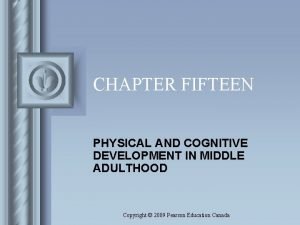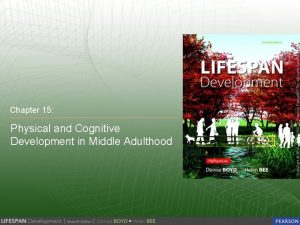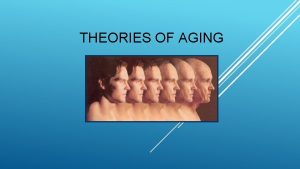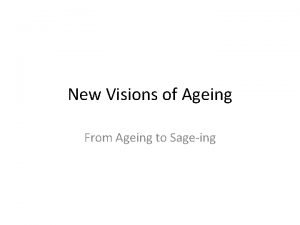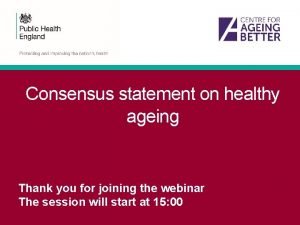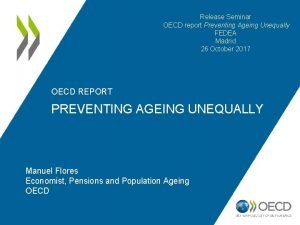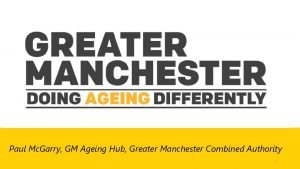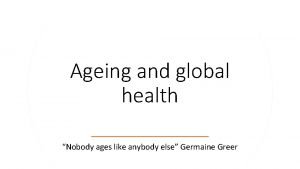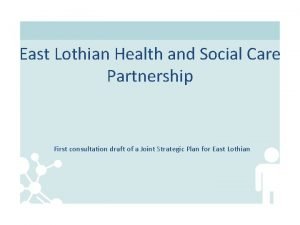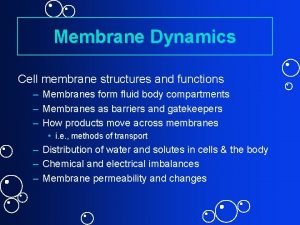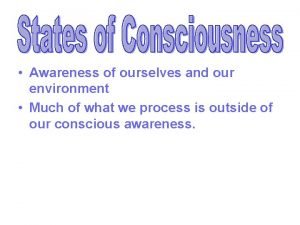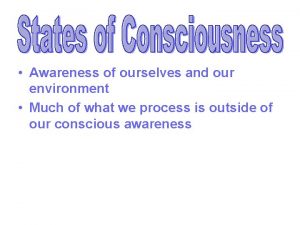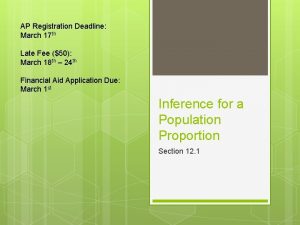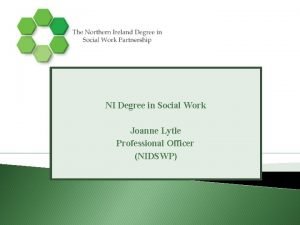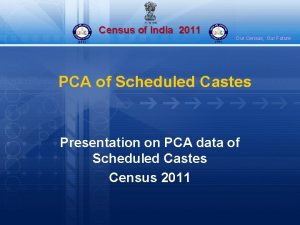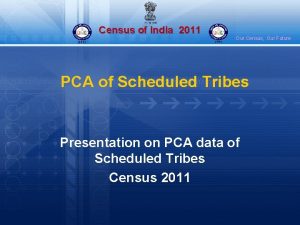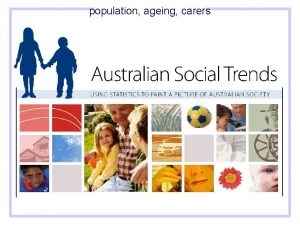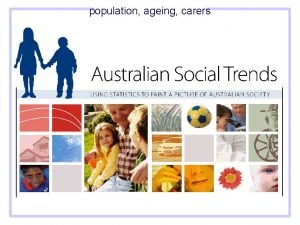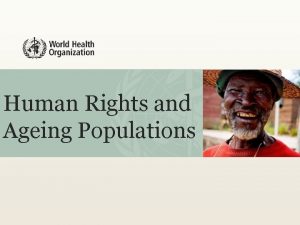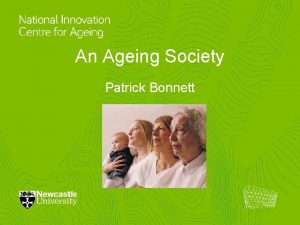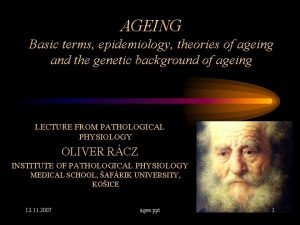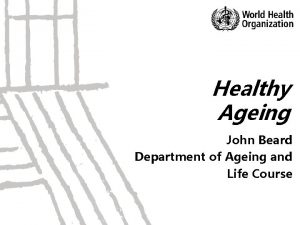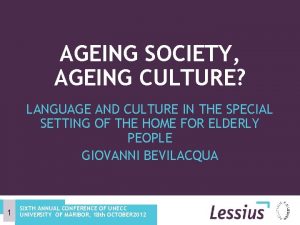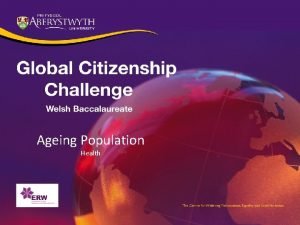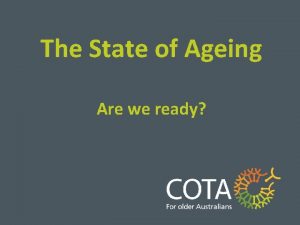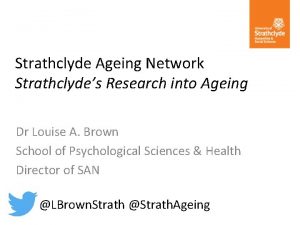Active Ageing and Social Partnership Matt Flynn Our





























- Slides: 29

Active Ageing and Social Partnership Matt Flynn

Our team CROW (UK) Fondazione Adapt Matt Flynn Chris Ball Paolo Tomassetti In partnership with: Trades Union Congress Employers Forum for Equality & Inclusion In partnership with: CISL Funzione Pubblica Feder. Distribuzione University of Granada University of Lodz Mariano Sánchez Pilar Diaz Iza Warwas Justyna Wiktorowicz Piotr Szukalski In partnership with: UGT Andalucía & CSI-CSIF (unionists) Cetursa, Insua, Macrosad, Thielmann Portinox (employers) In partnership with: NSZZ Solidarnosc Business Centre Club

About the project • European Commission funded • How social partners (unions and employers) engage on workforce active ageing • Aims and objectives: • develop, pilot and embed human resource management (HRM) interventions which support older workers • reconcile competing intergenerational interests • investigate ways in which social partners are shifting from an early retirement toward active ageing orientation • Provide resources (online and training) to support social partners in promoting active ageing

Agreement on Active Ageing • Agreement reached between Business Europe, UEAPME, CEEP, ETUC, Eurocadres, CEC • “Increased awareness and understanding of employers, workers, and their representatives of the challenges and opportunities derived from demographic change” • Tools and measures to be taken into account of impact of demographic change • Emphases on: • Health and activity up to legal retirement age • Intergenerational working • Social dialogue

The questions we’re asking: • What does your organisation think about a multi-generational and diverse work places? • What do you think older workers want in terms managing extended working life? • What is being done now to support older workers and promote active ageing? • How can social dialogue help?

Context • • Aging population – rising life expectancy and falling fertility – big gap in 40 s Government is incentivising working longer Many people would like to work longer and are capable Many older workers have caring responsibilities for older relatives, children, grandchildren Rising proportion in self employment (but often not by choice) A range of specialised roles exist, but are rare (mentoring, quality assurance, training, consulting) A significant group of highly qualified older people choose to “downshift” to less stressful roles Employers need to plan to manage and motivate

Collusion toward early retirement • State/employer incentives for early retirement • Employers • Shedding higher paid/higher status workers • Making way for younger workers • Government • Achieving full employment • Reducing industrial unrest • Unions • Protecting the right to retire • Preventing ‘contingent’ workforce tamping down wages • Job creation for younger workers

Industrial relations: Four models Union membership: 26% Agency model Strong class roots Emphasis on individual rather than collective rights Union membership: 35% Multi-employer bargaining model Particularism- devolved collective bargaining Weak vertical/stronger horizontal integration Union membership 19% National collective bargaining since 2008 History of social concertation Flexibilisation resulting from reforms in 2012 Union membership: 12% Catholic ideological axis Non-union works councils Union/non-union, employer and government representation via Council of Social Dialogue

Pensions and welfare: Four models Pension replacement rate: 29% Pension age rising to 68 by 2039 Liberal residual/Beveridgian welfare state Basic state pension Workplace pension Some longer working life incentives Pension replacement rate: 93. 2% Pension ages 66 men & public sector women/ 62 women Previdenza Obbligatoria: minimum basic pension Previdenza Complementare: DC for staff employed after 1995 Pension replacement rate: 81. 8% Pension age rising to 67 by 2027 Mixed/Bismarckian system Anticipated Retirement: Early retirement Partial/flexible retirement: Late retirement Pension replacement rate: 38. 6% Pension ages were rising to 67. Now 60/65 PAYG Guaranteed minimum pension Mandatory 2 nd tier DC system/ Occupation Pension Plans

What has changed? • Rising healthy life expectancy • Changing retirement patterns and expectations • European Union targets to increase older workers’ labour market participation • Employment Equality (Age) Directive 2001/ Age regulations • Intersectionality of age and other protected characteristics • Abolition of mandatory retirement in some countries • Pension changes • • Rising pension ages Increased risk for workers (DB to DC schemes) Elimination of early retirement routes (national and organisational) Creation of late retirement incentives

Social activation policies Single Equalities Act 2010 Abolition of Default Retirement Age 2010 Apprenticeship Levy 50+ (Humber); Older and Bolder (North East) Mid-life career review Worker Statute Act 2003 (Age+ intersectionality) Financial incentives for employers to hire 50+ Mobility allowance 36 months 50+ employees Mandatory retirement lawful but OW can delay claiming pension Age discrimination regs 2013 Abolition of mandatory retirement (except civil servants) Action Framework for Older People 2014 Integral Programme of Employment (Andalucía) PEEP: Internships (Andalucía) 2004 Amendment to EU Labour Code Mandatory retirement lawful European Year of Active Ageing 2011 Solidarity between Generations: 2008: Skills and Qualifications Emphasis on entrepreneurship and self-employment

Health and well-being • Wide variety of health and ability amongst older workers • One third of older inactive would like to work/one third of inactive work with a disability • Stress highest in mid-career; job insecurity highest at periphery • Job insecurity can be as bad on health as job loss • Job control, autonomy, manageable workloads associated with good health

Health and well-being: Ideas • NHS Working Longer Review Group (UK): review of longer working lives on all health sector professionals • 55+ Strategy (Spain): Amelioration of working conditions for 55+ • Volkswagen Poznan (Poland): emphasis on health checks, outpatient care, rehabilitation, job rotation • Bilateral bodies (Italy): Jointly managed funds to finance activities to support at risk workers

Skills and training • Skills shortages are widespread, and skills demands are rising, raising demand for some older workers • Older workers less likely to have (current/ any) formal qualifications which are valued by employers • Older workers are unlikely to consider themselves to have a training need • Employers less likely to train older workers, but training more universal in expansive organisations

Skills and training: Ideas • Midlife Career Review (UK): National pilot supported by unions, National Career Service, Learning Work Institute to provide career advice 50+ • Unionlearn (UK): Learning reps to promote training/ skills audits • Fondi paritetici interprofessionali per la formazione continua: Funds for retraining via bilateral bodies • Action Framework for Older People (Spain): Organising training to keep older workers’ skills updated

Joblessness and recruitment • High levels of youth unemployment and concern over ‘lump of labour’ • Long-term unemployment 50+ workers • Distressed older worker fearing displacement • Prevalence of age discrimination in job seeking • Experience but no formal qualifications • Employers can do more to develop the “talent pipeline”, especially for older people considering changing career direction • Skills issues for small businesses

Joblessness and recruitment- ideas • Barclays Bolder Apprenticeship (UK) • Life course work centres (UK) • ACTIVE 55+ (Andalucía) (Spain) • Pension top-ups for long term unemployed (Poland) • Progetto Ponti (Intergenerational Solidarity Pacts) (Italy)

Flexible working • The most frequently requested form of change • Informal flexible work arrangements more common than formal arrangements(flexitime, part-year, job sharing) • Organisational benefits (reputation, flexible firm) • Restricts career progression • More accepted if universal – not just for “special” groups

Flexible working- ideas • Phased Retirement BAE System (UK) • Right to request flexible working (UK) • Active Retirement: Pension incentives to return to work (Spain) • Intergenerational Relays (Italy)

Performance management • Formal and informal both matter • Relationships, and trust are critical • Line managers central to effective management • Older workers are less likely to receive it • Some younger managers find it difficult with older employees

Performance management - ideas British Telecom Wind Down/Step Down/Helping Hands/Ease Down (UK) Lifecourse Representatives (UK)

How can social dialogue help? • Giving older workers voice on their work environments • Balancing workforce demands and employees expectations • Sharing good practice between and within organisations • Investigating and innovating jointly • Facilitating dialogue at the: • Organisational level- Developing, piloting and embedding active ageing HRM • Workplace level- Managing change in the workplace • Individual level- Supporting older workers and their managers discuss plans

What are the barriers to dialogue? • Ageist assumptions of capabilities/skills • Limited career paths for older workers • Lack of adaptability of HRM policies • Collusion (perceived and unwitting) against active ageing • Lack of knowledge about active ageing (Spain) • Ageing is not a relevant issue yet for many employers/unionists (Spain)

Intergenerational conflict or solidarity? • Lump of labour theory or fallacy? • Are there career paths for younger workers? • Do younger workers feel that they have a say over their work? • Are they involved equally in ‘reinventing’ an active ageing workforce? • Interdependence of older and younger people • Transfer upward (e. g. pensions and eldercare) • Transfer downward (e. g. financial support and grandparenting) • Transfer of skills and knowledge • Mentoring • Intergenerational work teams

What interventions could promote active ageing? • Demographic funds (IT) • Mid-career reviews (UK) • Intergenerational training and mentoring (ES) • Succession Plans (ES) • Redesigned work processes (PL)

Who should be involved in the dialogue? • Unions • National level • Workplace/works council • Local reps • Employers • Senior managers • Local managers • Occupational Health • Government • Economic partnerships (e. g. LEPs, HR networks)

How to maintain an Active Ageing workplace • Leadership from the top of organisations/unions • Knowing where to get resources and share good practice • Building intergenerational solidarity • Use structures to resolve problems early • Joint management of demographic resources • Joint reviews of workforce demographic changes • Disseminating and sharing good practice with small businesses • Developing bespoke regional approaches to age management

Questions for you: • How does active ageing intersect with social partnership? • Are there dimensions which resonate with you? • Are there areas which merit further investigation? • How should we enhance impactfulness? • What training do social partners need? • How can we make our online tool useful to social partners? • How should we ensure sustainability? • Are there more partners with whom to work? • How do we encourage social partners take the baton?

We’d welcome your input! • www. adapt. it/aspire • @agediversity • www. facebook. com/agediversity • www. agediversity. org • m. flynn@agediversity. org
 Denny's model of physical and cognitive ageing
Denny's model of physical and cognitive ageing Denny's model of physical and cognitive ageing
Denny's model of physical and cognitive ageing Age stratification
Age stratification Ageing to sageing
Ageing to sageing Healthy ageing
Healthy ageing Fantasy theatre makeup
Fantasy theatre makeup Preventing ageing unequally
Preventing ageing unequally Greater manchester ageing hub
Greater manchester ageing hub Japanese ageing population
Japanese ageing population Ageing suit
Ageing suit Greater manchester health and social care partnership
Greater manchester health and social care partnership East ayrshire health and social care partnership
East ayrshire health and social care partnership East lothian health and social care partnership
East lothian health and social care partnership Boolean operators
Boolean operators Active transport
Active transport Awareness of ourselves and our environment is
Awareness of ourselves and our environment is Our awareness of ourselves and our environment is called
Our awareness of ourselves and our environment is called Awareness of ourselves and our environment is
Awareness of ourselves and our environment is Our awareness of ourselves and our environment.
Our awareness of ourselves and our environment. Gloria chavez and ronald flynn
Gloria chavez and ronald flynn Nidswp
Nidswp Primary active transport vs secondary active transport
Primary active transport vs secondary active transport Thinking affects our language, which then affects our:
Thinking affects our language, which then affects our: Our census our future
Our census our future Christ be our light
Christ be our light Our life is what our thoughts make it
Our life is what our thoughts make it We bow our hearts we bend our knees
We bow our hearts we bend our knees Our census our future
Our census our future Our life is what our thoughts make it
Our life is what our thoughts make it We quail, money makes us quail.why?
We quail, money makes us quail.why?
